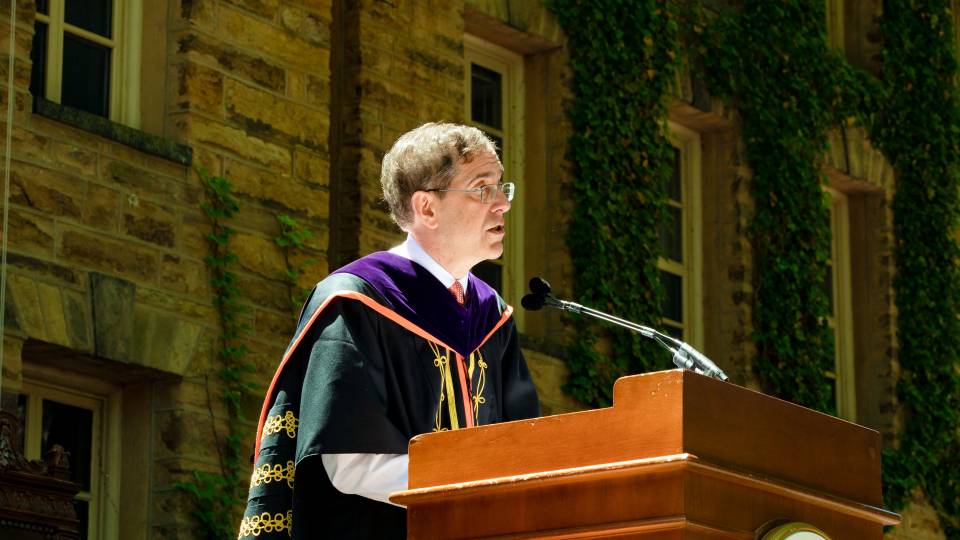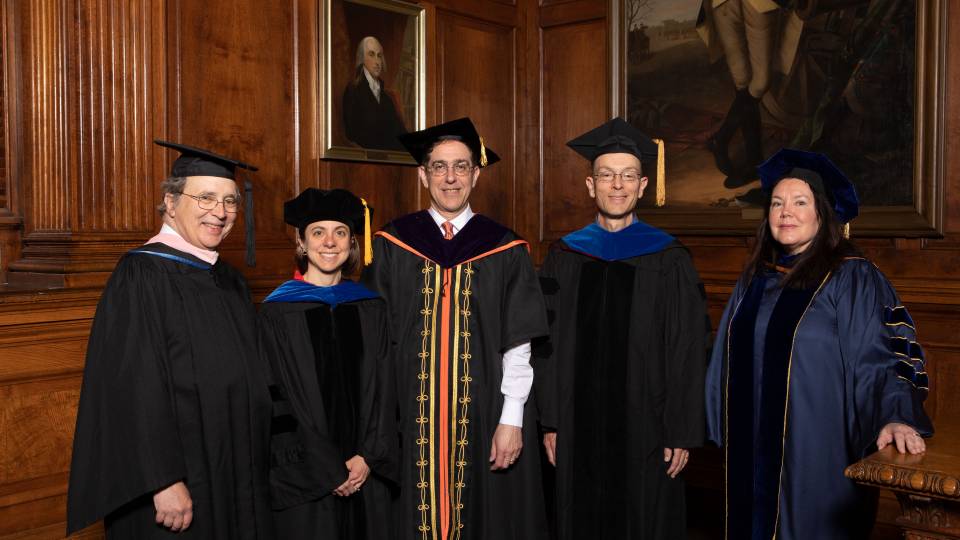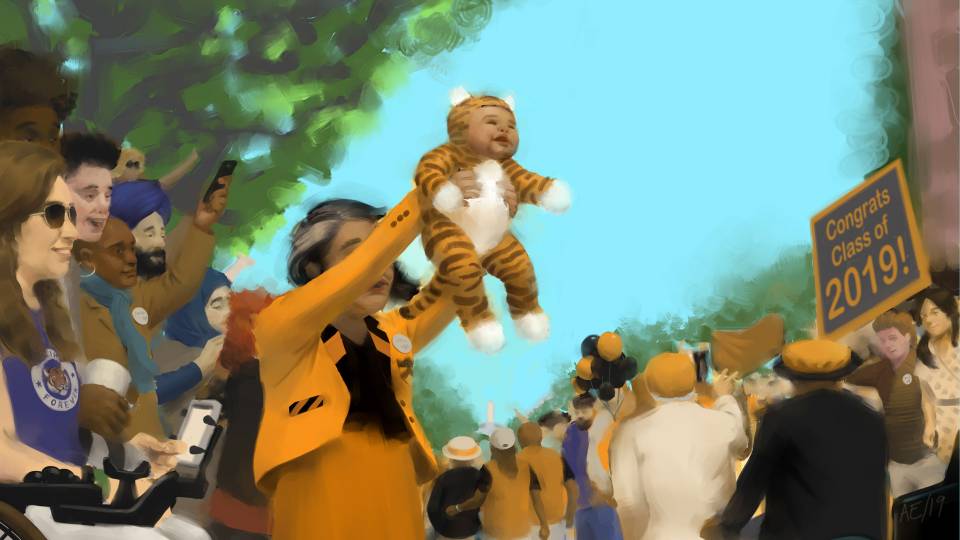--Remarks as prepared--
President Eisgruber
Trustees and faculty
Distinguished guests
And, especially, members of the Great Class of 2019.
Brevity is the soul of wit — or so said Polonius, the Shakespeare character least given to brevity. Dorothy Parker, an American wit, said — accurately — that brevity is the soul of lingerie. But on occasions such as this, with listeners eager to commence the rest of their lives, brevity is simply polite and prudent.
At the most recent graduation occasion that I addressed, I had a captive audience. It was at Sing Sing prison, where my listeners had lots of time on their hands. The 37 men were incarcerated because they had committed serious crimes. But during their incarceration they had earned college degrees. They did so in order to show, as one of them said, that prison was "not a landfill but a recycling center."
After the tape-recorded strains of Elgar's "Pomp and Circumstance," it was lunchtime and an inmate on the kitchen staff called out, "You've not had chicken until you've had chicken at Sing Sing." The chicken did not disappoint.
The striking thing about the 37 prisoner-graduates was that when they talked about their crimes they all — to a man — used the same vocabulary. They said they had made "bad choices." This recurring phrase, this emphasis on choice, affirmed their agency, their status as moral actors. These men, many of whom had not had what you and I think of as a childhood, were adamantly insisting on their adulthood.
I mention my sojourn at Sing Sing because I am alarmed by the infantilization of America. And by what Nebraska’s Senator Ben Sasse calls "the vanishing American adult."
This cultural phenomenon matters because, as has been well-said, politics is downstream from culture, and there are deleterious political consequences from the weakening of the adult culture of confident, measured and generous judgments about people and events.
Sasse, a Yale history Ph.D., reminds us that there was a time, before people commuted to work, when Americans in a mostly rural nation worked where they lived. Before the "generational segregation" of modern life, children saw adults doing the adult activity of work, often physical and gritty, and sometimes hazardous.
Seeing this, the children learned an important truth. It is a truth expressed by a Princetonian, F. Scott Fitzgerald, who said: "Nothing any good isn't hard."
Furthermore, children in the proximity of hard-working adults learned that adults are not just enlarged children. Adults, they learned, do praiseworthy things. And so, the children learned to praise — to admire.
Today, there is a serrated edge to America life. The nation is awash in expressions of contempt and condescension. What are called “social media” — and which might more accurately be called anti-social media — seem to encourage snarky expressions of disdain.
In this age of rage, disparagement is the default setting for many Americans. They seem to think that expressing admiration for someone or something is evidence of deficient critical faculties. To these habitual disparagers, maturity means a relentlessly-exercised capacity for contempt.
So, I hope that when you are asked what you learned at this University, you can truthfully answer: I learned to praise.
Intelligent praising is a talent. It is learned. Like all virtues, it is habitual. It is a habit. And it is a virtue we need more of, right now. It is the virtue of recognizing virtue, and saluting it.
Today, however, we live in what Arthur Brookes calls a “culture of contempt.”
Praise, Brookes says, is how we articulate admiration. And developing a talent for admiration is how we become less susceptible to feeling envy, which stokes anger.
We are apt to be happiest when we are least envious, because envy is the only one of the seven deadly sins that does not give the sinner even momentary pleasure. (I will pause here so that you can mentally go down the list.)
Envy is the desire to see others diminished — even if we gain nothing from their diminishment. Envy is, therefore, the opposite of praise, which is the act of celebrating others without feeling oneself diminished.
Actually, however, praising is an activity that does benefit the people who praise. It helps them to flourish by recognizing and savoring admirable attributes wherever they occur.
Praise is, therefore, an antidote to something that today’s America has too much of: anger. One reason we have this unpleasant surplus is that anger has become fun for many people.
Arthur Brookes believes, I think correctly, that anger can trigger dopamine in the brain, which gives pleasure — a potentially addictive pleasure. And the addiction to anger, like an addiction to heroin, must be fed by ever-more intense doses, until the anger-addicted person feels fully alive only when he or she is incandescent with indignation.
Let me give a small example of anger which, precisely because it is small, illustrates how anger has become a big problem.
At major league baseball games, fans often celebrate strikeouts achieved by the home team’s pitcher by hanging out placards with large “K’s” printed on them, K being the normal scorecard designation of a strikeout.
At a game in Atlanta, after a Braves pitcher had recorded his third strikeout, fans hung up third K sign. And someone — to use the telling language of our anger epidemic — someone was “triggered.”
This person, ignorant of what the three K’s meant, took to Twitter — of course — to express indignation about a Ku Klux Klan sign at the ball park.
Now, leave aside the fact that this episode revealed an alarming cultural illiteracy and educational failure: It is scandalous that someone can pass through America’s education system without learning the basics about keeping a baseball scorecard.
But what really interests me is how eager the person on Twitter was to be angry about something — anything. And how eager this person was to think the worst of others. I doubt that this person is given to generous praising.
Students who are taught how to praise are necessarily taught the standards by which we decide which people and things are praiseworthy.
And they learn the pleasure of praising, which is the pleasure of savoring the acknowledgement of excellence. This is a pleasure more durable, more lasting than the curdled pleasure of anger.
Furthermore, the recognition of excellence, which is what praising is, can help us make good decisions. A major league umpire understood this almost century ago.
In the 1920s, there was a rookie pitcher on the mound when Rogers Hornsby — the greatest righthanded hitter ever — came to the plate. The rookie threw three pitches that he thought were strikes — but the umpire said “Ball one,” “Ball two,” Ball three.”
The young pitcher, flustered, shouted to the umpire, “Those were strikes!” The umpire removed his mask, looked out at the pitcher, and said: “Young man, when you throw a strike, Mr. Hornsby will let you know.”
Hornsby had made himself the standard of excellence: If he didn’t swing at a pitch, it wasn’t a strike.
It is more than my hope, it is my assumption, that you who are now leaving this University have been equipped by it to become, yourselves, standards of excellence in your professions and in your lives.
You will be more apt to do this the more you exercise your talent for praising others who deserve emulation.
As you take your leave of the University, you take with you an understanding of excellence. This will enable you to have the regularly recurring pleasure of praising excellence when you see it. And this will equip you to be praiseworthy.
But, then, virtues are habits, and praise is habitual for Princetonians, who from their first day on campus learn to:
Tune every heart and every voice,
Bid every care withdraw,
Let all with one accord rejoice,
In praise of Old Nassau.
Note well the words “rejoice in praise.” These are words to live by — delighting in excellence, and in acknowledging excellence.
The words “rejoice in praise” are praiseworthy. As are you who have met the University’s high standards of excellence.
Thank you.























